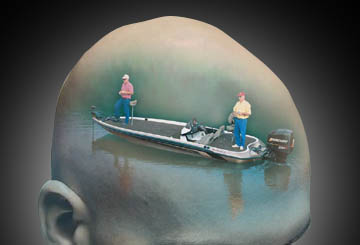Pro pointers No. 4: Psychological techniques of Olympians

The 2008 Summer Olympic Games are about to begin in Beijing, China. On video screens in stores, airports, sports bars and homes, the performances of the world’s greatest athletes will be on display. What will not be visible, however, are the many hours of physical and psychological training that prepared these competitors to play at this level.
A recent article by the American Psychological Association profiled nine sports psychologists who are assisting American athletes headed for Beijing. You may be surprised to find how many different events and teams have designated sports psychologists working with them.
For example, James Bauman Ph.D. is associated with the U.S. Swimming team, the U.S. Women’s Softball team and the first-ever U.S. Olympic Bicycle team. Another psychologist, Charlie Brown, Ph.D., assists the U.S. Whitewater, Canoe and Kayak teams. Dr. Chris Carr is the U.S. Diving team psychologist; Ross Flowers Ph.D. works with U.S. Track and Field athletes; and Dr. Karen Cogan is described as “the U.S. Tae Kwon Do team’s secret weapon.”
American athletes also have psychologists to help them in Water Polo, Shooting, Cycling, Field Hockey, Boxing, Wrestling and Weightlifting, to name just a few of the teams. Since that many Olympic sports rely on performance psychologists, maybe it would be worth reconsidering the role performance psychology could play for you as a competitive angler. Here then are some of the mental techniques these Olympic-level psychologists endorse.
Relaxation techniques
By far the most frequently used mental exercises are those that help individual athletes establish and maintain relaxed, focused concentration during performance. Regardless of your sport, you will be hard pressed to perform at your best if you are tense or distracted. Relaxation exercises can be quite complex, involving psychologist-assisted guided imagery, mental rehearsal and focused attention techniques.
However, there are also several very simple, uncomplicated breathing exercises that can help trigger peak performance. Weightlifters, for example, know to take in a deep breath before they pull/push/jerk/lift and then exhale fully and forcefully when they make their move.
You have seen basketball players at the free-throw line do the same thing. They bounce the ball a few times, take a deep breath and then exhale as they make the shot. Many baseball pitchers use a similar routine with each pitch. Some tennis players make a loud sound each time they hit a shot. What this represents is not shouting to intimidate an opponent but a vocal companion to exhaling fully with each racket swing (Try inhaling and shouting at the same time, and you’ll get the concept).
Now get in your boat and consider imitating these athletes! For example, taking deep breaths while you drive from one spot to another is a technique that does several things for you. To begin with, you can’t breathe deeply for very long and stay tense. Sure, two or three deep breaths won’t take you from aggravated or snarly to blissful relaxation, but if you concentrate on your breathing during a 10-minute run from one spot to another, the odds are very high you’ll arrive in a better psychological place than you left.
Distraction control
Every athlete in every sport gets distracted. In fact, distraction is such a powerful impediment to performance that individuals as well as teams use it as a defensive tactic. If you can distract your opponent, you can more easily defeat him. Think back to those cowboy shows you watched on TV as a kid. The Good Guy and the Bad Guy are squared off in the street for a gunfight, staring intently at each other. Suddenly, the Good Guy glances off to one side and gets a startled look on his face. Naturally, the Bad Guy, who is paranoid to begin with, turns to see what the Good guy is looking at, whereupon the Guy with the White Hat draws his Colt .45, and the gun battle is over.
It works the same way in fishing. There you are – paying close attention, focusing intently – when suddenly a Jet Ski passes too close, or another angler (your boat partner?) distracts you: That’s when you get bit! Occasionally you might get that fish, but often you don’t.
Admittedly it’s difficult to pay attention to every single one of the few thousand casts you make during a typical tournament day. In a perfect performance-enhancement world, some guy from the World Fishing Network would videotape you fishing for several days, after which he would calculate the number of casts you made where you were highly attentive, the number of casts where you were partly distracted and the number of casts you made with your head up in the clouds. Then you would have an accurate base rate against which to make improvements.
Since that’s not going to happen, you will need to break your concentration pattern down into manageable components on your own. So, let’s say, for your next tournament practice day, you set a goal to concentrate fully on five casts in a row. Start with a couple of deep breaths and focus only on your lure. As you cast, shift your focus to your target and then to your lure as it enters the water; next focus intently on your line as you retrieve your lure. Do that four more times.
If that’s easy to do, try making seven or nine casts in a row. If five casts with full concentration is difficult, back up to three. The most important thing is to get into a pattern or rhythm like basketball players at the free-throw line or pitchers on the pitcher’s mound.
Visualization
One of my favorite colleagues, K, is neither an Olympic athlete nor a competitive angler. However, in my experience she is one of the best at using visualization to improve performance. K, by all accounts, has an impossible boss. And while K typically starts each morning with a smile, positive energy and enthusiasm, by the end of the day, she frequently appears emotionally discouraged – except on Friday afternoons, when she is consistently positive, cheerful and very productive. On Friday after lunch, she gets more done than three people together.
As a psychologist, I probably should have figured this out sooner, though it wasn’t until last Friday that I put the pieces together. As usual, K was wearing her Friday-afternoon, Cheshire-cat grin. “It’s Friday afternoon, K,” I said. “YES, it is,” she said emphatically. Suddenly recalling her fondness for liquids made with hops and barley, I smiled back and asked: “That visualization stuff works, doesn’t it?” And K replied, “It certainly does!”
Our Olympic athletes use relaxation, distraction control and visualization. You, too, can use them to become a better angler.

————————————————–
Jay T. McNamara, Ph.D., L.P., also known as Dr. Fish, recently finished his book “The Psychology of Exceptional Fishing.” You can order it by contacting Jay via e-mail at this address: [email protected].
————————————————–
Jay T. McNamara, Ph.D., L.P., is a psychologist, who is also an avid bass and walleye angler. With more than 26 years of professional experience complemented by participation in competitive fishing at local and national levels, he is uniquely qualified to illustrate how performance psychology principles apply to tournament fishing.